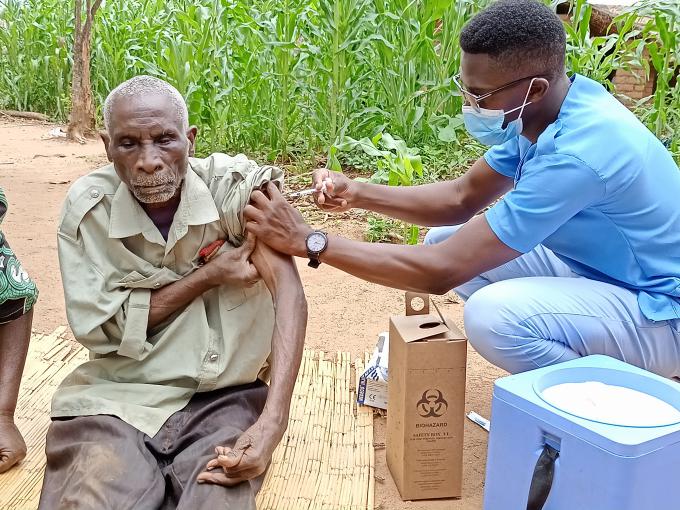Door-to-door Vaccinations for Elderly Reaps Results

Blind and partially paralysed by a stroke a decade ago, 84-year-old Thomas Mgundo is a shining light in the drive to vaccinate the country’s population.
“When I heard of the coronavirus and the huge death toll that it has left in its wake, I was really worried because I had heard that the elderly such as me were especially at risk,” he said.
But it was not without any fears.
“Of course there were rumours that people who take the vaccines would die within five months. But I know for a fact that the government cannot procure to harm its citizens. And for some of us, we have been taking vaccines since the 1940s and yet we are still alive today,” he said.
Spurred by these fears and the knowledge that the vaccines protect him from the virus, Mgundo decided to take the jab in September.
But Mgundo’s immobility made it practically impossible for him to travel to the health centre as the only mode of transport in these areas are motorcycles or bicycles.
“There was no way I could have made it to the hospital and I would have died if I had been infected. There would have been no other way,” he said.
Mgundo is from Nikisi Village in Mzanza district in the south of Malawi which is off the radar. To get there, one has to take the dusty and bumpy 12 kilometre ride from the town.
In this village of 784 people, like in most rural outposts across Malawi, rumours revolving around Covid-19 vaccines are rife, resulting in low uptake.
But even in cases where the villagers have been convinced to take the vaccine, the trip to the nearest clinic—five kilometres away—makes this an even more daunting task.
But these factors have not deterred the octagenarian Mgundo who got his jab last September.
Tamandani Kuchanje is the Cluster Supervisor for Tulonkhondo area under which Nikisi Village falls and he explained that, worried with by the fact that the elderly would not be able to travel to the health centres to receive Covid-19 vaccines, the district health office embarked on an outreach project to reach them in their homes.
In Nikisi Village, the target was to vaccinate all of the 24 elderly residents.
“But we ended up vaccinating 39 because some of them were in the village where they were visiting their relatives,” he said.
Kuchanje noted that home outreach visits are more effective as they are more interactive.
“During the door-to-door visits, we are able to talk to people directly and explain to them in greater detail. And because we have ample time, we also listen to their fears and assure them on the benefits and effectiveness of the vaccines,” he said.
He added that as custodians of culture, the elderly should be protected at all costs.
“So if we vaccinate them, we are assured that we are protecting and safeguarding our culture,” he said.
Village headwoman Nikisi explained that the success of the project can be attributed to the fact that chiefs have taken a leading role in mobilising communities to get vaccinated.
“When the senior chief mobilised all chiefs in the district and urged us to take part in the fight against Covid-19, I took up this challenge and also rallied my subjects towards the cause.
“As such, we have been going door-to-door explaining to them the need to get vaccinated. Also, to show my commitment, I was the first one to be vaccinated because I wanted people to have faith. If anything bad was going to happen as a result of the vaccination, then it was going to happen to me,” she said.
The outreach drive is spurred by the ‘Support the Rollout of Malawi’s Covid-19 National Vaccination Campaign’ which is being implemented countywide by an NGO consortium with support from the European Union with the specific objective of reducing the further spread of Covid-19 in Malawi by enhancing access to the vaccine.
Malawi’s vaccine uptake remains low due to scepticism about the vaccination.
Of the Malawi government’s target of 11 million adults to be vaccinated by the end of last year, only 800,000 have received at least one dose of the vaccine.
Save the Children are leading a consortium of international NGOs that are implementing the programme in the south of the country.
Save the Children Project Manager Harrison Sikalamwa says the programme’s impact is seen in the numbers of people that are lining up to receive the vaccines.
“When you meet the people in person, you are able to allay their fears and to assure them that vaccines are safe and they are the way to go,” he said.
He added that while Malawi’s target is to vaccinate 30 percent of the population by February end, the numbers in the areas where the programme is active dwarf the national average.
“We have seen that in the areas where the project is active, the uptake is higher than the national average because we have hit 80 percent vaccination rates in some areas,” he said.
He noted that one of the biggest lessons from the project is the role that chiefs have played.
“When people see their leaders coming down to the communities and taking the vaccines, it raises confidence among the communities and increases uptake,” he said.
 Malawi
Malawi